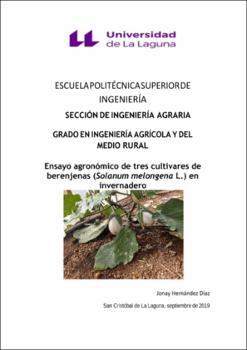Ensayo agronómico de tres cultivares de berenjenas (solanum melongena L.) en invernadero.
Autor
Hernández Díaz, JonayFecha
2019Resumen
Este trabajo consiste en el estudio agronómico de tres cultivares de berenjena
donde se han evaluado diferentes parámetros agronómicos. El ensayo se llevó
a cabo en los invernaderos de la facultad de la Escuela Politécnica Superior de
Ingeniería Sección de Ingeniería Agraria. Los objetivos de este ensayo son la
comparación a nivel agronómico de las variedades de berenjena (Blanca, Negra
de Olvera y Almagro); analizando los rendimientos y la precocidad, y estudiando
los parámetros principales: peso, longitud y diámetro, en condiciones de
invernadero. El ensayo se realizó siguiendo un diseño estadístico de cuatro
bloques al azar con tres repeticiones, de los tres cultivares y con plantas bordes.
La parcela en total tenía 98 plantas, siendo la densidad de plantación de una
planta por metro cuadrado. La siembra se realizó en el día 11 de febrero de 2019
y el trasplante el día 2 de abril de 2019. La recolección comenzó el día 10 de
junio de 2019 y finalizó el día 22 julio de 2019. Tras cada recolección se
estudiaron los parámetros: peso, diámetro y longitud, y finalmente el rendimiento
y la productividad. Los análisis cuantitativos obtenidos se sometieron a un
análisis de varianza con el programa SPSS-19, comprobándose previamente las
hipótesis de normalidad y homocedasticidad. Se separaron las medias a través
de un test de Tukey. Para el peso, diámetro y longitud se encontraron diferencias
significativas al nivel de 0.05 en todas las variedades.
Los parámetros estudiados indican claramente que las variedades que mejor
se adaptan a las condiciones de cultivo son la Negra de Olvera y la Blanca,
obteniéndose un mejor rendimiento y productividad en la primera mencionada
que en la segunda, mientras que la variedad Almagro no ha alcanzado los
valores esperados.
Trascurrido el cultivo en el cual se llevaron a cabo las labores pertinentes se
procedió a la recolección. This work consists in the agronomic study of three eggplant cultivars where
different agronomic parameters have been evaluated. The test was carried out in
the greenhouses of the faculty of the Ecole Polytechnique Supérieure d'Ingénieur
Section of Agricultural Engineering. The objectives of this trial are the agronomic
comparison of the eggplant varieties (White, Negra de Olvera and Almagro);
analysing yields and precocity, and studying the main parameters: weight, length
and diameter, in greenhouse conditions. The trial was carried out following a
statistical design of four random blocks with three repetitions, of the three
cultivars and with border plants. The total plot had 98 plants, with a planting
density of one plant per square metre. Planting was carried out on February 11,
2019 and transplanting on April 2, 2019. Harvesting began on 10 June 2019 and
ended on 22 July 2019. After each harvest, the following parameters were
studied: weight, diameter and length, and finally yield and productivity. The
quantitative analyses obtained were subjected to a variance analysis with the
SPSS-19 program, previously checking the hypotheses of normality and
homocedasticity. The means were separated through a Tukey test. For weight,
diameter and length, significant differences were found at the level of 0.05 in all
varieties.
The parameters studied clearly indicate that the varieties that best adapt to
growing conditions are the Black Olvera and White, obtaining a better yield and
productivity in the first mentioned than in the second, while the Almagro variety
has not reached the expected values.
After the crop in which the relevant work was carried out, the harvest was
carried out.





